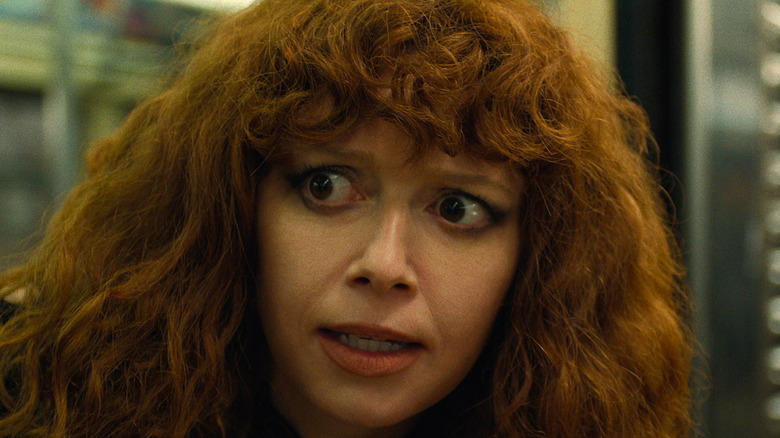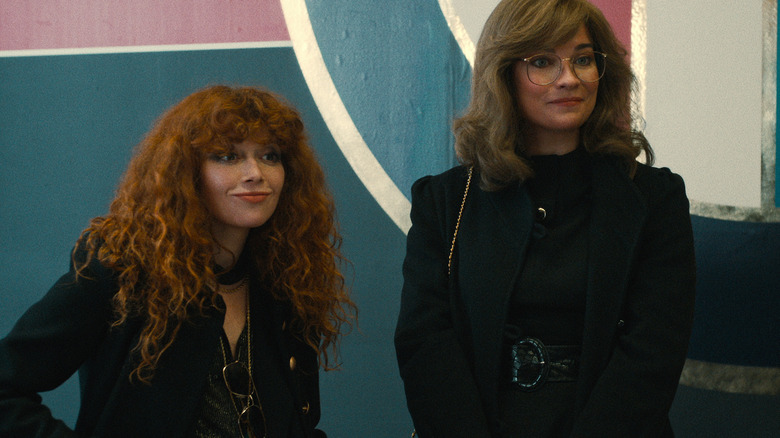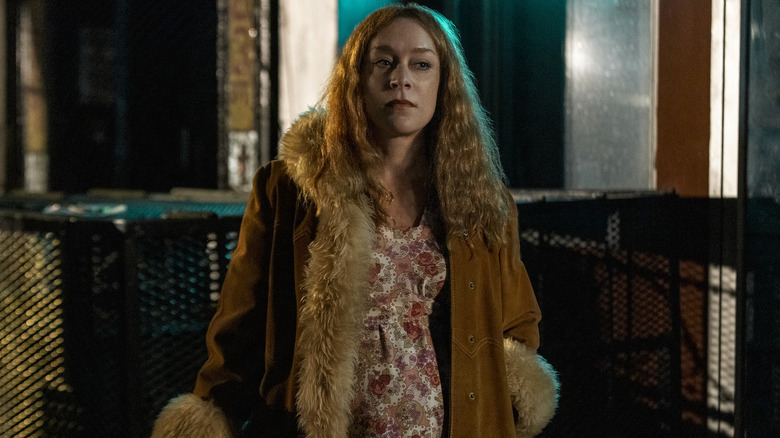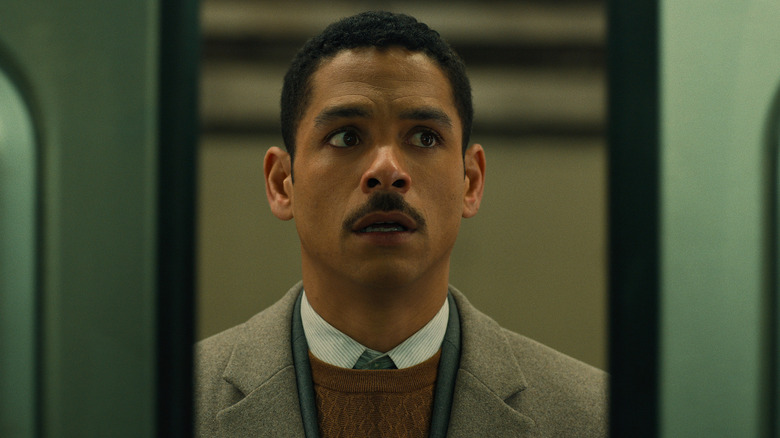The Ending Of Russian Doll Season 2 Explained
Contains spoilers for "Russian Doll" Season 2.
In Season 2 of "Russian Doll," four years have passed since Nadia Vulvokov (Natasha Lyonne) and Alan Zaveri (Charlie Barnett) escaped their reality-bending time loop thanks to some serious self-introspection. Season 1 of the Netflix series, created by Lyonne, Leslye Headland, and Amy Poehler, hints that Nadia still has some issues to work through, primarily her complicated relationship with her emotionally and mentally unstable mother, Lenora (Chloë Sevigny).
At the start of the new season, Nadia is on the cusp of turning 40, and she is devoting more time to caring for her surrogate mom, Ruth Brenner (Elizabeth Ashley). Nadia remains close to Alan, who is still single and struggling to make a love connection. However, this time around, the stakes are higher. The pair discovers the New York City subway allows them to travel back in time, giving them each a shot at righting some previous wrongs, thus altering the trajectory of their lives, as well as the lives of their loved ones.
Anyone familiar with time-traveling movies (however casual their relationship with the genre may be) knows it's not a good idea to mess with history, which Alan points out to Nadia in Episode 1. But even he can't resist the temptation to meddle when he realizes his choice of whether or not to futz with all things temporal is a matter of life or death. Although Nadia and Alan's respective storylines aren't as interwoven as they were in Season 1, they eventually converge as they, once again, must stave off a looming apocalypse. Here's a breakdown of the ending of Season 2 of "Russian Doll."
Nadia learns she can't change the past
Unlike "Russian Doll" Season 1, which sees Nadia both endlessly pondering and actively fighting to get out of a time loop, she now doesn't questioning why she can travel back in time. Instead, she immediately seizes on the opportunity to witness family history unfolding firsthand. The infamous Krugerrands that Lenora stole are back in play, and Nadia is determined to recoup the gold pieces her mother squandered in 1982, convinced it will erase the dysfunctional mother-daughter dynamics briefly addressed in Season 1 and give her a clean slate
Lenora is present in the form of a hallucination comprised of Nadia's memories and other people's perceptions of her, particularly Vera's (Irén Bordán) and the recently-widowed Ruth's ("Schitt's Creek" star Annie Murphy). Lenora is a more sympathetic character in the series' sophomore season. She is shown to be a woman whose mother's cold and controlling nature results from her experiences during World War II. Nadia inhabits her mother's body, but not her mind, so Lenora's motivations (if any are identifiable) for anything she does, other than her mental health issues, remain unexplored, keeping the disconnect between mother and daughter firmly in place.
Nadia's plan is doomed to failure because she's singularly focused on the wrong thing. It's never within her power to fix anything. So, in a last-ditch effort to evade destiny, Nadia kidnaps the 1982 infant version of herself, convinced she's better off raising herself. Of course, her "Aha!" moments come fast and furious during the finale. She has to sacrifice the gold and surrender herself to Lenora to save the world. Not exactly a happy ending.
Russian Doll explores the complexities of fractured family dynamics
In the Season 2 finale of "Russian Doll," Lenora asks Nadia, "If you could choose your mother all over again, would you choose me?" Nadia acknowledges it wasn't her decision to make the first time, but "that's just how the story goes." As a young girl, Nadia always felt powerless around her mother, and her actions throughout the season demonstrate that the harder she tries to exert control, the more chaotic things become. As far as Nadia's screwed-up childhood goes, this appears to be the closest thing to closure she'll ever get.
Season 2 of "Russian Doll" explores the complexities of mother-daughter relationships, but more importantly, the show establishes that familial bonds are not determined solely by genetics. Sadly, Nadia gets so caught up in the past that she neglects the most important person in her life — Ruth. Nadia may not see it coming, but gloom and doom are barreling toward her with the same force as a speeding subway train.
Ruth disappears from Nadia's life suddenly as Oatmeal. What seems like a disservice to the character who manages in Season 2 to be both pivotal and overlooked in equal measure is likely foreshadowing what's to come if Netflix renews the show for a third season. As Nadia stands alone in the bathroom that serves as the starting point of every time loop in Season 1, something in her expression belies her grief. Not so coincidentally, the Universe gives Nadia a do-over when mortality is at the forefront of her mind.
Alan and Nadia temporarily part ways in Season 2
Alan's experience with time travel in Season 2 of "Russian Doll" isn't as interesting as Nadia's. While inhabiting his grandmother's body, he discovers she's involved in a plan to smuggle people from Berlin into West Germany. Alan is torn between warning them of their impending death (or even capture). After failing to stop them, he is thrown into an existential crisis. Nadia and Alan's different approaches to their parallel dilemmas reinforce why they need each other. However, for two people cosmically linked, it's disappointing they don't share more screen time.
Natasha Lyonne's character is the more cerebral and verbose of the two, and there's a lack of complexity in Alan that carries over from Season 1. He borders on sedate, but his vulnerability and earnestness are a welcome respite from Nadia's harshly-delivered skepticism. For viewers who find it at times tiresome to trudge through her scarred psyche, Alan's conversation with his grandmother is a sweet encapsulation of the season's central theme: Some things are meant to be.



